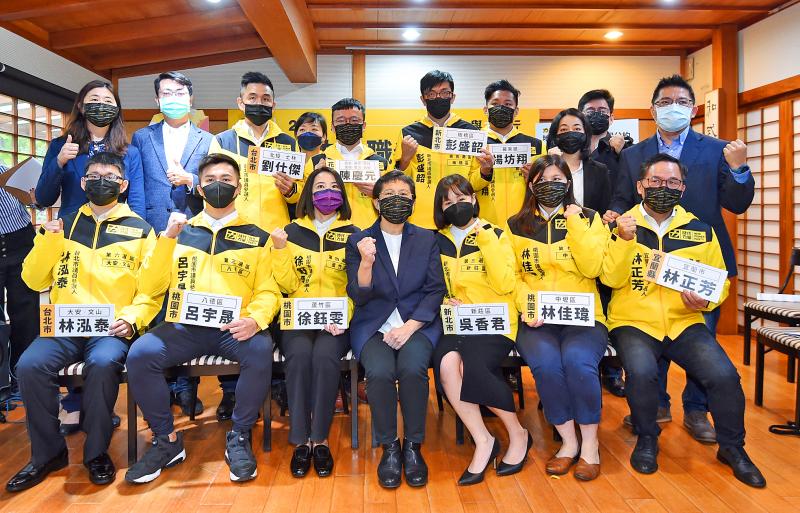The New Power Party (NPP) on Thursday announced its first list of candidates to contest city and county councilor positions in November’s local elections, but it declined to confirm whether it would field any mayoral candidates.
The NPP said it has chosen six men and four women to run for councilor positions in Taipei, New Taipei City and Taoyuan, as well as Yilan and Hualien counties.
The party “hopes to bring more young talent into local councils,” NPP Chairwoman Chen Jiau-hua (陳椒華) said, adding that it aims to field as many as 50 councilor candidates across Taiwan.

Photo: Liu Hsin-de, Taipei Times
The party is expected to announce more candidates in the following weeks, including incumbent councilors seeking re-election, Chen said.
NPP Secretary-General Christy Pai (白卿芬) said that it took the party a long time to settle on “the best candidates,” who are prominent in fields such as advocacy, politics and social services.
The 10 candidates include former diplomat Liu Shih-chieh (劉仕傑), who is the NPP’s director of international affairs.
Liu, 41, said that if he is elected as a Taipei city councilor, he would focus on promoting bilingual education, and addressing traffic and safety problems.
Wu Hsiang-chun (吳香君), a founding member of the NPP who has worked in the party’s election campaigns for eight years, is to run for city councilor in New Taipei City’s fourth electoral district, which includes Sinjhuang District (新莊).
Asked whether the party would put up mayoral candidates, Chen said that “we certainly hope to have our own candidates.”
Hsinchu is where the NPP is most likely to field a mayoral candidate, she said, adding that “a lot of people have been encouraging” NPP Legislator Chiu Hsien-chih (邱顯智) to run there.
The party is still assessing the situation, Chen said, making mention of a Democratic Progressive Party push to merge Hsinchu City and Hsinchu County into a special municipality.
The NPP has had more support in the Hsinchu region than in any other part of Taiwan, with four of its 11 councilors in the region.
It would not rule out collaborating with other parties in mayoral elections, Chen said.

The Coast Guard Administration (CGA) yesterday said it had deployed patrol vessels to expel a China Coast Guard ship and a Chinese fishing boat near Pratas Island (Dongsha Island, 東沙群島) in the South China Sea. The China Coast Guard vessel was 28 nautical miles (52km) northeast of Pratas at 6:15am on Thursday, approaching the island’s restricted waters, which extend 24 nautical miles from its shoreline, the CGA’s Dongsha-Nansha Branch said in a statement. The Tainan, a 2,000-tonne cutter, was deployed by the CGA to shadow the Chinese ship, which left the area at 2:39pm on Friday, the statement said. At 6:31pm on Friday,

The Chinese People’s Liberation Army Navy’s (PLAN) third aircraft carrier, the Fujian, would pose a steep challenge to Taiwan’s ability to defend itself against a full-scale invasion, a defense expert said yesterday. Institute of National Defense and Security Research analyst Chieh Chung (揭仲) made the comment hours after the PLAN confirmed the carrier recently passed through the Taiwan Strait to conduct “scientific research tests and training missions” in the South China Sea. China has two carriers in operation — the Liaoning and the Shandong — with the Fujian undergoing sea trials. Although the PLAN needs time to train the Fujian’s air wing and

The American Institute in Taiwan (AIT) put Taiwan in danger, Ma Ying-jeou Foundation director Hsiao Hsu-tsen (蕭旭岑) said yesterday, hours after the de facto US embassy said that Beijing had misinterpreted World War II-era documents to isolate Taiwan. The AIT’s comments harmed the Republic of China’s (ROC) national interests and contradicted a part of the “six assurances” stipulating that the US would not change its official position on Taiwan’s sovereignty, Hsiao said. The “six assurances,” which were given by then-US president Ronald Reagan to Taiwan in 1982, say that Washington would not set a date for ending arm sales to Taiwan, consult

A Taiwanese academic yesterday said that Chinese Ambassador to Denmark Wang Xuefeng (王雪峰) disrespected Denmark and Japan when he earlier this year allegedly asked Japan’s embassy to make Taiwan’s representatives leave an event in Copenhagen. The Danish-language Berlingske on Sunday reported the incident in an article with the headline “The emperor’s birthday ended in drama in Copenhagen: More conflict may be on the way between Denmark and China.” It said that on Feb. 26, the Japanese embassy in Denmark held an event for Japanese Emperor Naruhito’s birthday, with about 200 guests in attendance, including representatives from Taiwan. After addressing the Japanese hosts, Wang